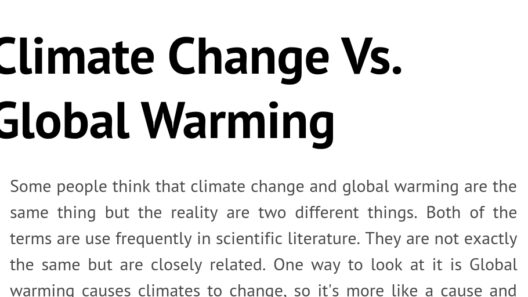In a world undergoing rapid ecological transformation, our daily actions wield significant influence over the fate of the planet. Have you ever pondered the aggregate impact of your seemingly minuscule choices? What if I posed a playful challenge: could your next week’s habits contribute to a cooler planet? Let us navigate through the intricacies of our environmental footprint and discover how even the smallest actions can culminate in substantial change.
To comprehend the challenge, one must first understand the crux of global warming. This phenomenon is propelled by the relentless accumulation of greenhouse gases, notably carbon dioxide, in our atmosphere. These gases act like a blanket, trapping heat and contributing to rising temperatures. The sources? Predominantly from combustion processes—vehicles, industrial activities, and even our energy consumption at home. The question looms: would it be possible for each individual to exacerbate or alleviate this crisis through their daily choices?
Choices behind energy consumption remain at the focal point of this discussion. The average household is a hub of energy expenditure—from cooking meals to powering devices, heating, and cooling. Thus, a fundamental practice to combat global warming is to optimize energy efficiency. Switching to energy-efficient appliances, like LED bulbs or ENERGY STAR-rated refrigerators, can significantly reduce energy demand. Imagine if every household made this switch; the cumulative energy saved would be staggering, resulting in decreased carbon emissions and a substantial reduction in our collective ecological footprint.
Equally important is the method of energy generation itself. If feasible, transitioning to renewable energy sources such as solar or wind power represents a robust strategy for minimizing individual carbon footprints. While the initial investment may appear daunting, various incentives and rebates can lighten the financial burden. Moreover, advocating for sustainable energy policy at local, state, and federal levels can amplify this individual commitment into a societal movement, encouraging a transition towards greener infrastructure.
Transportation is another potent area where choices resonate loudly. The ubiquitous reliance on fossil fuel-powered vehicles contributes significantly to greenhouse gas emissions. Consider this: public transport, biking, carpooling, or even adopting electric vehicles can yield monumental environmental benefits. By challenging oneself to forgo personal vehicle use for a week, one could observe not only the economic savings but also the environmental positive impact of reduced emissions. Engaging in such a challenge fosters awareness and encourages habitual change, proving that personal actions can extend far beyond individual experience.
Your dietary choices hold untold influence over climate change as well. The production of meat, particularly beef, is resource-intensive and contributes significantly to greenhouse gas emissions. Incorporating more plant-based meals into your diet can substantially reduce your carbon footprint—eating even one vegetarian meal a week can contribute to a world of difference. Considering alternatives like legumes, grains, and vegetables can not only be rewarding for your health but also an impactful commitment to environmental preservation.
Moreover, consumer behavior dramatically influences climate change dynamics. The items we purchase often carry hidden environmental costs. Selecting sustainable options—not just within food, but also in clothing, electronics, and household goods—encourages responsible consumption. Supporting local artisans or businesses that prioritize eco-friendly materials and methods cultivates a market that valuably respects the planet’s resources. Challenging oneself to minimize single-use plastics and incorporate reusable products into daily life is a necessary commitment for fostering a sustainable future.
Furthermore, education plays a pivotal role in combating climate change. By educating ourselves and our communities on matters of climate science, the consequences of unchecked warming, and practical solutions, we can amplify our influence. Hosting or participating in workshops, discussions, or local environmental clean-ups not only solidifies our understanding but also galvanizes collective action. The more informed we become, the better positioned we are to advocate for effective policies and initiatives that prioritize sustainability.
Making choices is not simply an isolated endeavor; it is a collaborative effort. Engaging friends, family, and colleagues amplifies the potential impact of individual actions. Consider initiating a sustainability challenge within your circle—a month of mindful consumption, reducing waste, or enhancing energy efficiency. Such collective endeavors can breed enthusiasm, fostering a positive feedback loop of environmentally responsible behavior among peers.
As we conclude this investigation of “Your Choices, Our Climate,” reflect on the potential of your choices. The interplay between individual actions and global outcomes highlights an undeniable truth: each small step taken consciously contributes to a larger collective stride toward combating global warming. The challenge remains—will you commit to shifting your habits in the name of a healthier planet?
In our interconnected world, every action reverberates. This labyrinth of choices we navigate daily presents a potent opportunity: the power to combat climate change lies within each of us. By redefining our habits, embracing sustainability, and inspiring others, we can indeed forge a path toward a cooler, more resilient earth.








